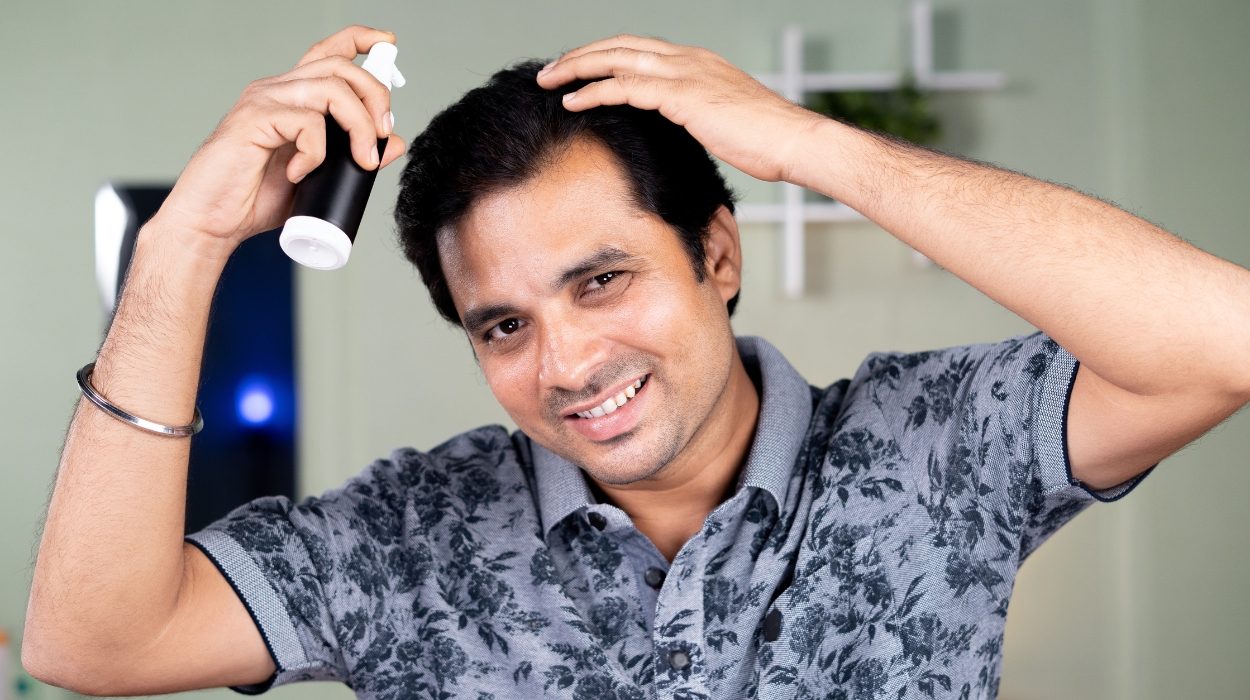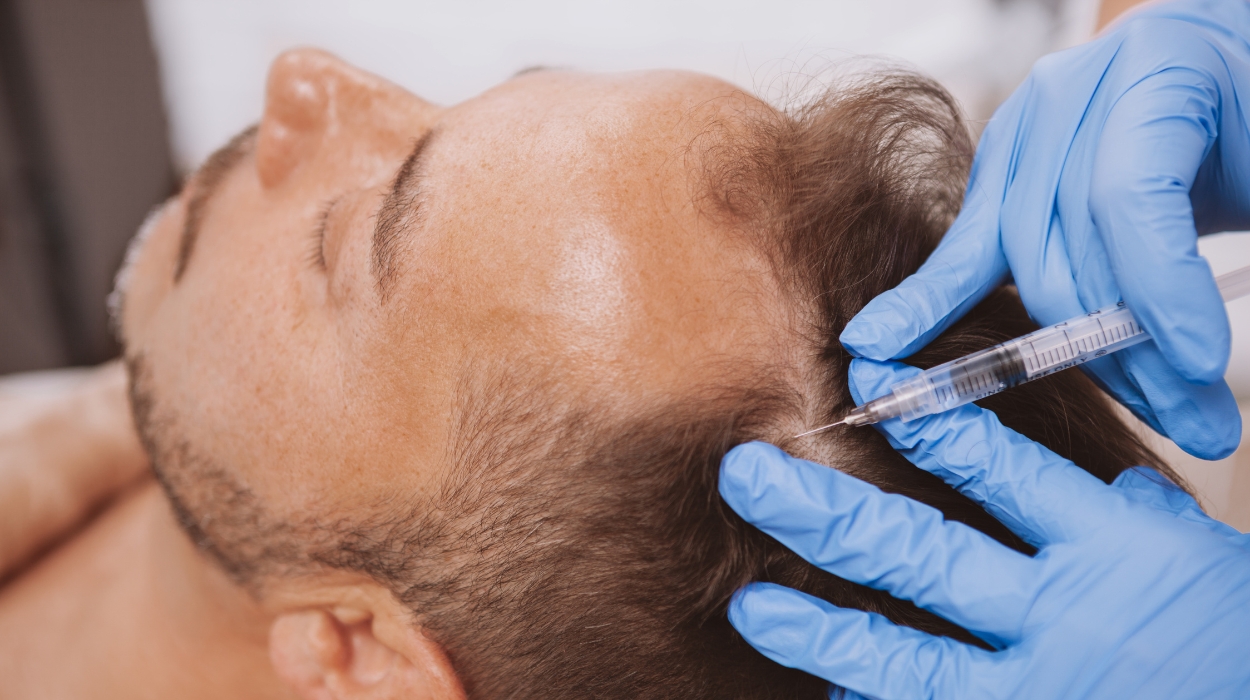 Expert's opinion
Expert's opinion
Expert's opinion
The article is a subjective view on this topic written by writers specializing in medical writing.
It may reflect on a personal journey surrounding struggles with an illness or medical condition, involve product comparisons, diet considerations, or other health-related opinions.
Although the view is entirely that of the writer, it is based on academic experiences and scientific research they have conducted; it is fact-checked by a team of degreed medical experts, and validated by sources attached to the article.
The numbers in parenthesis (1,2,3) will take you to clickable links to related scientific papers.
How To Regrow Thinning Hair & Male Pattern Hair Loss In 2024

Hair loss can be a worrying issue for many men, especially those experiencing male pattern baldness.[1] This article will explore various methods and strategies to help you regrow thinning hair for male pattern hair loss.
First, you want to understand what’s causing your hair loss so you can find the right treatment plan. Hormones, genetics, nutritional deficiencies, and lifestyle factors all may play a role.
To effectively treat your thinning hair, addressing the underlying factors contributing to hair loss is essential, whether it involves improving your diet, managing stress, targeted therapies, or superfoods for hair.
How To Regrow Thinning Hair For Men?
Hair loss can be a traumatic experience for men, but luckily there are various methods to help fix thinning hair. Some examples of ways to treat thinning hair include:
- Minoxidil
- Maintain A Healthy Diet
- Essential Oils
- Ginseng
- Platelet-Rich Plasma
- Fish Oil
The most beneficial for you will depend on the underlying causes of your hair loss.
How To Regrow Thinning Hair And Male Pattern Hair Loss
Thinning hair and male pattern hair loss can be frustrating, even traumatic, but effective hair loss treatment is available. Here are some of the most effective alternative treatments for thinning hair and treating male pattern hair loss. There is no bald cure, as such, but there are steps to stall loss and prompt re-growth.
Minoxidil

You might be familiar with minoxidil,[2] an FDA-approved topical treatment that promotes hair growth. Apply it to your scalp daily to experience promising results. Minoxidil is shown to regrow hair and slow down hair loss[3] for many people.
Maintain A Healthy Diet
A well-balanced diet with adequate protein, zinc, and essential nutrients can promote hair growth.[4] Consuming protein-rich foods is essential for strong hair, as it is hair’s main building block. Zinc-rich foods like oysters, beef, and pumpkin seeds contribute to hair growth. You should also consume enough selenium,[5] which can be found in Brazil nuts and various fish like tuna and sardines. Anti-oxidants and B vitamins are important for hair health and can contribute to hair loss when deficient.[4]
Essential Oils
Massaging your scalp with rosemary oil may help improve hair growth. This essential oil has been studied for its potential to stimulate hair growth.[3] Other essential oils for hair, like coconut oil,[6] also show promise, helping reduce protein loss from the hair due to excessive UV exposure or chemical treatments.
Ginseng
Ginsenosides, the active components of ginseng, are believed to promote hair growth by stimulating hair follicles.[7] Applied topically or consumed as a supplement, ginseng may be an effective treatment for men’s thinning hair.
Platelet-Rich Plasma

Platelet-Rich Plasma therapy involves injecting your own platelet-rich plasma into your scalp, potentially stimulating hair growth.[8] Consult with a medical professional before considering this treatment.
Fish Oil
Rich in omega-3 fatty acids, fish oil aids hair growth by nourishing hair follicles. Including it in your diet or taking a supplement can be beneficial in helping to regrow thinning hair[9] in males naturally. However, human research is still relatively sparse, so other hair loss treatments may be preferable.
Incorporating these hair loss treatment options can help you effectively address thinning hair, increasing hair density, and reducing hair loss. If a treatment regimen doesn’t work and all solutions fail, there is always hair transplant surgery. Hair transplants offer a more permanent solution to treat hair loss due to genetics, chronic stress, or female pattern hair loss.
Always consult a healthcare professional before starting any new treatment or supplement.
What Causes Thinning Hair And Hair Loss In Men?
Numerous factors contribute to hair loss in men, including genetics, hormones, medications, and stress.
One of the major causes of hair loss in men is male pattern baldness, otherwise known as androgenic alopecia.[1]
Your scalp contains hair follicles, which are responsible for hair growth. Androgens, a group of hormones including testosterone, can cause hair follicles to shrink and ultimately lead to hair loss. Studies[10] have shown that men with genetic predispositions are more likely to experience male pattern baldness.
Another common cause is telogen effluvium. This is a temporary hair loss condition, often caused by stress or an underlying issue [11], such as a thyroid problem or an inflammatory condition. Telogen effluvium[12] occurs when many hair follicles in the growth phase suddenly shift to the resting phase, leading to shedding and thinning hair.
Certain medical conditions can also lead to hair loss in men, including autoimmune conditions like lupus, thyroid imbalances, and other hormonal imbalances.
Nutritional deficiencies can also contribute to hair loss in men, specifically a lack of biotin, riboflavin, folate, and B12.[4] Making sure that you eat a balanced diet with the necessary nutrients is crucial for maintaining healthy hair.
Some medications are believed to cause hair loss as a side effect, including certain antidepressants, blood pressure medications, and cancer treatment drugs.
Lastly, inflammation of the scalp can lead to hair loss.[13] Conditions such as dandruff, eczema, or psoriasis can cause inflammation and damage the hair follicles, ultimately leading to hair loss.
Understanding the causes and taking appropriate measures to address them can help you fight hair loss and encourage hair regrowth.
Hair Care Tips For Men To Avoid Hair Loss
Taking care of your hair is important to maintain its health and prevent thinning or hair loss. Here are some tips to help you care for your hair and potentially avoid male pattern hair loss.
1. Keep your scalp clean: Maintaining a clean scalp is key for promoting hair health. Make sure to wash your hair regularly with a gentle shampoo to prevent a buildup of oils and dirt.
2. Be gentle with hair: Avoid using harsh hair devices or styling tools, which can cause damage and breakage. Instead, let your hair air dry and opt for simple, natural hairstyles.
3. Moisturize your hair and scalp: Keep your hair and scalp well-hydrated to avoid dryness and brittleness. Natural ingredients like aloe vera or coconut oil are great choices to provide extra moisture.
4. Increase your intake of essential nutrients: A balanced diet rich in essential fatty acids, biotin, and other vitamins can improve your hair’s health. Incorporate foods like salmon, walnuts, and avocados for their beneficial properties.
5. Massage your scalp regularly: Scalp massage can help stimulate blood flow, providing essential nutrients to the hair follicles. This can promote hair growth and help prevent hair loss.
Incorporating these hair care tips can help maintain your hair’s health and potentially prevent or slow down male pattern hair loss.
When To See A Doctor
Experiencing hair loss can be very upsetting, especially when you’re unsure what’s causing it. So, when should you consider seeing a doctor? If you find yourself regularly shedding more hair than usual, it’s time to consult a professional.
Dermatology and hair loss clinics specialize in diagnosing and treating hair loss, so they’re an excellent place to start. Checking for hormonal imbalances can also help identify contributing factors.
So, don’t worry if you’re noticing hair loss. Plenty of options are available to overcome this challenge, from medications to simple lifestyle changes. And in more extreme cases of hair loss, a wig or even hair transplantation might be considered after extensive consultation with your doctor.
The Bottom Line
The loss of your hair can naturally cause some alarm, but luckily, a range of treatments is available. Treating hair loss effectively requires addressing the underlying causes — hormones, genetics, nutrition, and lifestyle factors — then seeking the appropriate treatments. You should consult a healthcare professional for personalized guidance and recommendations when you first notice there is a problem, as early intervention is key.
+ 13 sources
Health Canal avoids using tertiary references. We have strict sourcing guidelines and rely on peer-reviewed studies, academic researches from medical associations and institutions. To ensure the accuracy of articles in Health Canal, you can read more about the editorial process here
- Asfour, L., Cranwell, W. and Sinclair, R. (2023). Male Androgenetic Alopecia. [online] Nih.gov. Available at: https://www.ncbi.nlm.nih.gov/books/NBK278957/.
- Medlineplus.gov. (2017). Minoxidil Topical: MedlinePlus Drug Information. [online] Available at: https://medlineplus.gov/druginfo/meds/a689003.html.
- Panahi (2015). Rosemary oil vs minoxidil 2% for the treatment of androgenetic alopecia: a randomized comparative trial. Skinmed, [online] 13(1). Available at: https://pubmed.ncbi.nlm.nih.gov/25842469/.
- Almohanna, H.M., Ahmed, A., Tsatalis, J.P. and Tosti, A. (2019). The Role of Vitamins and Minerals in Hair Loss: A Review. [online] 9(1), pp.51–70. doi:https://doi.org/10.1007/s13555-018-0278-6.
- Nih.gov. (2020). Office of Dietary Supplements – Selenium. [online] Available at: https://ods.od.nih.gov/factsheets/Selenium-HealthProfessional/.
- Kaushik, V., Ritesh Chogale and Sudhakar Mhaskar (2020). Alternative protocol for hair damage assessment and comparison of hair care treatments. [online] 12(1), pp.7–7. doi:https://doi.org/10.4103/ijt.ijt_3_20.
- Gyeong Hun Park, Ki Ho Park, Cho, H.-Y., Sang Yup Lee, Ji Won Han, Chong Hyun Won, Sung Eun Chang, Mi Woo Lee, Jee Ho Choi, Kee Chan Moon, Shin, H., Yong Soo Kang and Lee, D.-H. (2015). Red Ginseng Extract Promotes the Hair Growth in Cultured Human Hair Follicles. [online] 18(3), pp.354–362. doi:https://doi.org/10.1089/jmf.2013.3031.
- Anon Paichitrojjana and Anon Paichitrojjana (2022). Platelet Rich Plasma and Its Use in Hair Regrowth: A Review. [online] Volume 16, pp.635–645. doi:https://doi.org/10.2147/dddt.s356858.
- Kang, J.-I., Hoon Hahn Yoon, Sung Wan Kim, Jeong Young Park, Yu Jae Hyun, Ko, A., Ahn, Y., Young Hag Koh, Jin Won Hyun, Eun Sang Yoo and Kang, H.-K. (2018). Mackerel-Derived Fermented Fish Oil Promotes Hair Growth by Anagen-Stimulating Pathways. [online] 19(9), pp.2770–2770. doi:https://doi.org/10.3390/ijms19092770.
- Izabela Urysiak-Czubatka, Kmiec, M. and Grażyna Broniarczyk-Dyła (2014). Assessment of the usefulness of dihydrotestosterone in the diagnostics of patients with androgenetic alopecia. [online] 4, pp.207–215. doi:https://doi.org/10.5114/pdia.2014.40925.
- Hughes, E.C. and Saleh, D. (2023). Telogen Effluvium. [online] Nih.gov. Available at: https://www.ncbi.nlm.nih.gov/books/NBK430848/.
- Shashikant Malkud (2015). Telogen Effluvium: A Review. Journal of Clinical and Diagnostic Research. [online] doi:https://doi.org/10.7860/jcdr/2015/15219.6492.
- Wolff, H., Fischer, T. and Blume-Peytavi, U. (2016). The Diagnosis and Treatment of Hair and Scalp Diseases. [online] doi:https://doi.org/10.3238/arztebl.2016.0377.



